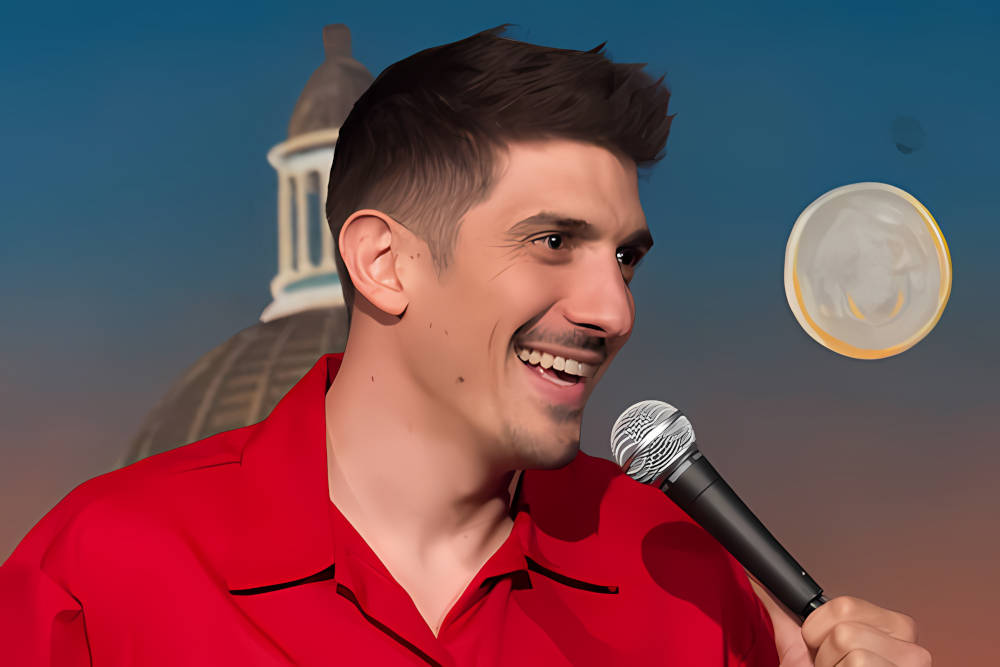
Bevor es Debatten in den sozialen Medien oder 24-Stunden-Nachrichtenzyklen gab, gab es Spaßmacher, Satiriker und Stand-up-Comedians .
Von den antiken Straßen Roms bis zu den Late-Night-Bühnen Amerikas war Comedy schon immer mehr als nur Unterhaltung – sie war ein Spiegel, der der Macht vorgehalten wurde .
Heute tragen Komiker wie Leonarda Jonie , Andrew Schulz , Jimmy Carr und JP Sears diese Fackel weiter und nutzen Humor, um die Zensur zu durchbrechen, Doppelmoral aufzudecken und auszusprechen, was viele Leute denken – und zwar laut.
👉 Sehen Sie sich hier das vollständige Video an:
Panaprium ist unabhängig und wird vom Leser unterstützt. Wenn Sie über unseren Link etwas kaufen, erhalten wir möglicherweise eine Provision. Wenn Sie können, unterstützen Sie uns bitte monatlich. Die Einrichtung dauert weniger als eine Minute und Sie werden jeden Monat einen großen Beitrag leisten. Danke schön!
Die alten Wurzeln der Satire
Politische Komödie ist nichts Neues – sie ist uralt.
Die Römer hatten Dramatiker wie Juvenal und Aristophanes , die vor Jahrhunderten Korruption, Führer und soziale Heuchelei verspotteten. Ihr Ziel war es nicht nur, die Menschen zum Lachen zu bringen – sie wollten sie aufrütteln .
Satire wurde zu einem Werkzeug der Rebellion – eine clevere Möglichkeit, die Autorität herauszufordern, ohne einen Krieg anzuzetteln.
Es erinnerte die Menschen daran, dass Lachen mächtiger sein kann als ein Schwert.
„Es ist gefährlich, die Wahrheit zu sagen – aber viel sicherer, wenn man es lustig macht.“
Derselbe rebellische Geist lebt auch heute noch weiter, von Sketch-Shows bis hin zu viralen Stand-up-Clips, die von Millionen geteilt werden.
Der Aufstieg der politischen Satire in der modernen Komödie
Schneller Vorlauf ins 20. Jahrhundert – Komiker wie Lenny Bruce , George Carlin und Richard Pryor begannen, Grenzen zu überschreiten, die das Publikum sowohl zum Lachen als auch zum Nachdenken brachten.
Sie stellten Regierung, Religion und soziale Normen in Frage und bewiesen, dass Komödie gleichzeitig intellektuell, emotional und politisch sein kann.
Ihr Mut inspirierte Generationen – darunter moderne Stimmen wie Bill Maher , Ricky Gervais und Dave Chappelle –, die sich angesichts der politischen Korrektheit weigern, sich selbst zu zensieren.
Konservative sehen diese Figuren heute als Erinnerung daran, dass die Komödie die Macht herausfordern und nicht ihr dienen sollte.
Von SNL zu YouTube: Das neue Zeitalter der politischen Komödie
In den frühen 2000er Jahren wurde die politische Komödie zum Mainstream – Late-Night-Shows, Sketche und Roasts wurden zu einem alltäglichen Standard.
Doch als Hollywood und die Medien progressiver wurden, führten YouTube und Podcasts zu einer neuen Welle unabhängiger Komiker .
Leute wie JP Sears , Tim Dillon , Leonarda Jonie und Andrew Schulz haben sich online ein riesiges Publikum aufgebaut, indem sie Dinge gesagt haben, die andere nicht sagen würden.
Ihre Komik entsteht nicht aus Hass, sondern aus Ehrlichkeit.
Sie nutzen Humor, um Doppelmoral anzuprangern, die Woke-Kultur herauszufordern und wieder Kontakt zu normalen Menschen aufzunehmen, die einfach wieder lachen möchten.
Das Internet machte die Comedy freier – und das Publikum folgte den Wahrheitsverkündern.
Roasts: Die moderne Evolution der Satire
Wenn Satire der Funke war, sind Roasts das Lauffeuer .
Moderne Roasts sind zu viralen Sensationen geworden – Komiker zerlegen mit brutaler Präzision und perfektem Timing die Argumente der „Woke“-Bewegung und die politische Heuchelei.
Von Quinn Dales furchtlosen politischen Attacken bis zu Tyler Fischers wilden Imitationen ist der Roast zur modernen Waffe der Satire geworden – direkt, roh und ungefiltert.
Was früher in verrauchten Clubs passierte, verbreitet sich heute über das Internet und verändert die politische Kultur mit jeder Pointe neu.
Abschluss
Von der antiken Satire bis zu modernen Roasts war das Ziel der Komödie immer dasselbe:
der Macht die Wahrheit zu sagen – und das mit einem Lachen.
Die heutigen Komiker stehen in dieser langen Tradition.
Sie sind nicht nur Entertainer; sie sind Kulturkommentatoren – die letzten ehrlichen Stimmen in einer Welt, die sich selbst zu ernst nimmt.
Und im Jahr 2025, wenn die Redefreiheit überwacht wird und Empörung die Währung ist, ist politische Komödie wichtiger denn je .
🎥 Sehen Sie sich hier das vollständige Video an:
War dieser Artikel hilfreich für Sie? Bitte teilen Sie uns in den Kommentaren unten mit, was Ihnen gefallen oder nicht gefallen hat.
Haftungsausschluss: Die oben genannten Inhalte spiegeln nicht unbedingt die Meinung von Panaprium wider. Panaprium übernimmt keine Garantie, Bürgschaft oder Billigung der oben genannten Inhalte und ist in keiner Weise dafür verantwortlich. Alle hier geäußerten Meinungen basieren auf persönlichen Erfahrungen und sollten nicht als Billigung oder Garantie bestimmter Ergebnisse angesehen werden. Politische Kommentare sollten aufgrund der subjektiven Natur der Politik kritisch betrachtet werden.
About the Author: Alex Assoune
Wogegen Wir Kämpfen
Weltweit-Konzerne produzieren in den ärmsten Ländern im Übermaß billige Produkte.
Fabriken mit Sweatshop-ähnlichen Bedingungen, die die Arbeiter unterbezahlt.
Medienkonglomerate, die unethische, nicht nachhaltige Produkte bewerben.
Schlechte Akteure fördern durch unbewusstes Verhalten den übermäßigen Konsum.
- - - -
Zum Glück haben wir unsere Unterstützer, darunter auch Sie.
Panaprium wird von Lesern wie Ihnen finanziert, die sich unserer Mission anschließen möchten, die Welt völlig umweltfreundlich zu gestalten.
Wenn Sie können, unterstützen Sie uns bitte monatlich. Die Einrichtung dauert weniger als eine Minute und Sie werden jeden Monat einen großen Beitrag leisten. Danke schön.


















0 Kommentare